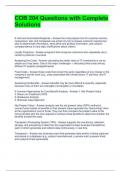Exam (elaborations)
COB 204 Questions with Complete Solutions
- Course
- Institution
COB 204 Questions with Complete Solutions E-mail and Automated Response - Answer-the most popular tool for customer service, inexpensive, fast, and companies use email not only to answer customer inquiries but also to disseminate information, send alerts and product information, and conduct cor...
[Show more]



